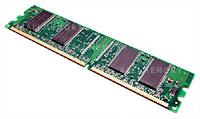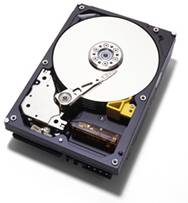
FACTORS THAT CAN CAUSE YOUR COMPUTER TO SLOW DOWN OR ACT WEIRD
1) Lack of RAM (memory chips) – computers that are one to three years old or older will most likely be short on RAM, and will be slower than they should be, especially if you have Windows XP Service Pack-3, which is the version of Windows that most people have. To add more RAM to your computer will cost about $20.00 to $150.00+, depending on how much more you need or want – the more you put in, the faster your computer will be, but the increase in speed will only be about 10-40% at the most. Although it isn't difficult to add more RAM, buying the right kind (there are probably over 20 different kinds of RAM) and knowing how to install it can be tricky so this should be done by a professional. Be sure to back up all of your critical personal data first before you let anyone open up your computer.
RAM:

Note: RAM memory is different from Hard Drive memory. A Hard Drive stores all of your programs and data [sort of] permanently. RAM is short-term memory that is wiped out when the power to the computer is turned off. RAM is where the processing of data, such as the bits and bytes of the picture you see on the screen, takes place.
Hard Drive (with the top cover removed):

2) Spyware – spyware (a.k.a. "malware" and "adware") can slow down your Internet access because the spyware is tracking which websites you are looking at or recording other information on your computer and sending this information out over the Internet in the background. Install a good anti-spyware program like Spy Sweeper or the new version of Norton Internet Security 2009 or Norton 360 to prevent spyware from infecting your computer.
Remember: Spyware is bad; anti-spyware is good except for "rogue" or scam anti-spyware programs (!). See the definitions for virus and spyware below.
3) Virus (a.k.a. "worm" or "Trojan") – a virus could be sending copies of itself out over the Internet in the background or downloading additional viruses or spyware onto your computer. This can really slow down your system. If you recently installed an anti-virus program, this could cause a slowdown because the anti-virus program is checking for viruses each time you start your computer or open certain documents or files, and checking for updates to the anti-virus program itself.
Definitions: A virus is usually a small program that some hacker writes to surreptitiously take over your computer and do something bad, such as: 1) propagate itself to the computers of everyone in your e-mail address book; 2) download pornography, or direct your web browser to pornographic websites or scam anti-spyware program download and purchase sites (to trick you into paying for a program you don't need!!!); or 3) steal your passwords, Social Security number and online banking PIN numbers; and 4) display salacious messages on your screen, change some of your file names or delete some of your important files.
Spyware is usually written by scumbag companies on the Internet who want to track where you go on the Internet or take over your web browser or search page, but it can also be written by hackers who want to steal your passwords and see ALL of the text you are typing on your computer. Spyware can also include "cookies," which are small text files that websites put on your computer to uniquely identify you and track which ads you are looking at. Generally, cookies are innocuous, and some of them help you save a few steps when you log on to certain websites, such as your online banking, stock brokerage or newspaper websites. Here are two great websites that explain more about spyware: [1] and [2].
4) Updates – if your computer is downloading updates to Windows, like the new Service Pack-3; Internet Explorer (especially the new Microsoft Internet Explorer 8.0); Norton AntiVirus; graphics programs like the Kodak EasyShare program or the HP Image Zone program; and so on in the background, this could result in a noticeable delay in the operation of your computer, but this slowness should go away in a few minutes, hours, or a day or two.
5) Settings – if your network card has the wrong settings or the wrong driver (software), your Internet access could get slower. If your wireless network card is connecting to your neighbor’s wireless network instead of your own (!), your Internet access could slow down, because the signal coming from your neighbor's router might be weaker. See our wireless networking instructions for more information.
6) America Online – America Online will cause a slowdown in your computer because it installs so many sub-programs, such as the Safety and Security Center, that automatically load into RAM when you start your computer. If too many members are accessing AOL at the same time, your AOL service could slow to a crawl even if you are accessing AOL through a High Speed Internet Service, such as Road Runner, Cox, Comcast, DSL, etc. This slowdown will be especially pronounced during the holidays as people check prices before going to the malls, order gifts online, order airline tickets, etc.
7) Downloading music, movies, videos, etc. - if you or someone in your family is using a program such as Bearshare, BitComet, BitTorrent, KaZaa, LimeWire, Morpheus, Grokster, P2P Networking, etc., your computer could get extremely slow as it downloads files, games, music, movies, video clips, and viruses and spyware (yes, it's very easy to get viruses and spyware this way) in the background.